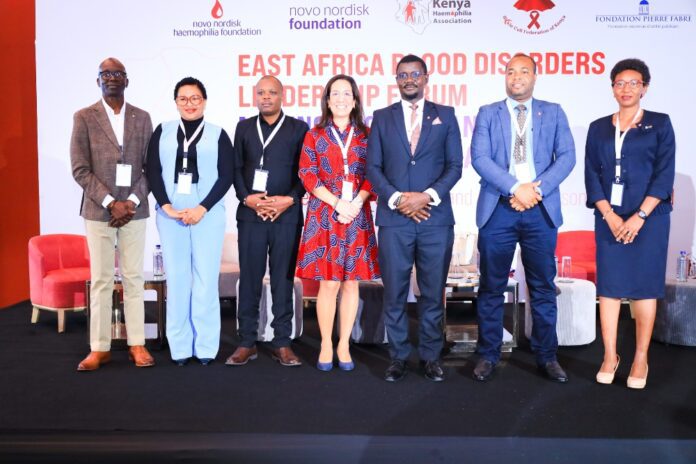Experts and key stakeholders in the health sector have urged East African governments to prioritize enhanced care for blood disorders in the region.
In a meeting that brought together thought leaders, patient organizations, government representatives, and patients to advance healthcare solutions and strategies for improved patient outcomes across the region, speakers emphasized the need to enhance diagnosis rate, access to care, advocacy and awareness, research and collaboration.
Prof. Johny Mahlangu, Council member, of Novo Nordisk Haemophilia Foundation, emphasised the need for partnership to realize progress in this. “We believe that partnerships and collaborations are at the heart of what we do. Today is an opportunity for us to build,
strengthen, and utilize these partnerships to benefit the people living with blood disorders and their communities,” said Prof. Mahlangu.
Mr Harry K. Kimtai, CBS, Principal Secretary, State Department for Medical Services, Ministry of Health, Kenya, recognized that blood disorders exert a devastating economic burden on individuals and households, driving many into abject poverty.
“In this forum, we represent a broad spectrum of expertise—from clinical research and patient advocacy to health policy and innovation. Each perspective here brings invaluable insight.
Our discussions will touch upon essential areas: advancing the early diagnosis, improving treatment accessibility, enhancing care equity, and fostering research to develop new therapies,” said Mr Kimtai in a statement read by Dr Rebecca Kiptui, Director of Clinical and
Nursing Services at the Ministry of Health.
Kenya has progressed in diagnosing and managing blood disorders through its partnership with several stakeholders. Twelve comprehensive haemophilia and Sickle cell care centres have been established through collaboration with the Novo Nordisk Haemophilia
Foundation. Training of healthcare professionals on haemophilia management is continuously ongoing to enhance quality service delivery.
Investing in adolescent health: A key to Africa’s economic growth
Dr. Kibet Shikuku, Chair, of Kenya Haemophilia Association, highlighted the importance of collaborations between government ministries within the region to share working modalities from one country and replicate them in other countries. He added, “There is a need to pull resources and use methods that will enable countries to judiciously use the resources. The importance of data in helping the government in policy-making and resource allocation
regardless of how low the numbers might show.”
The Kenyan government remains committed to collaborating with development partners and relevant bodies to advocate for improved access to care, provide support for individuals living with blood disorders and their families, and raise awareness.
Francis Njau, Business Unit Head, Novo Nordisk called on East African governments to raise awareness of blood disorders from all populations. “Blood disorders will be fully addressed if the leadership takes ownership of this. From strengthening the in-country health systems to offering training to healthcare providers, there is a lot to be done to achieve a better life for patients with blood disorders,” said Njau.
Prof Karanja Njoroge, Chair to the Board, of Kenya Haemophilia Association (KHA) emphasized the need to address the numerous challenges faced by individuals with blood disorders in East Africa, especially in trying to access affordable and efficient care.
“Individuals with blood disorders in East Africa often face challenges in accessing appropriate diagnosis, treatment, and support services. Limited healthcare infrastructure, inadequate trained healthcare professionals and scarcity of treatment products can all contribute to
suboptimal care for individuals with blood disorders in the region,” said Prof Karanja.
The two-day event seeks to raise awareness of blood disorders among the government and the general public about the prevalence, impact, and challenges of these conditions. The forum also discussed the need to advocate for adequately trained healthcare professionals to provide comprehensive care to people with blood disorders, including nursing, counselling, and physical therapy, and standardized blood disorders training curricula.
“Limited healthcare infrastructure, inadequately trained healthcare professionals and scarcity of treatment products can all contribute to suboptimal care for individuals with bleeding and blood disorders in the region,” said Dr Elisha Osati, MD, MMED, FAIMER Fellow, PhD Fellow Chair-Tanzania Sickle Cell Disease Alliance (TSDA).
In the wake of pressing health challenges in East Africa, the forum recognizes the critical role played by patient associations, healthcare professionals, and governments in creating a healthcare system that accommodates the pertinent issues affecting patients with blood
disorders in East Africa, Z and South Africa.
Globally, haemophilia affects 1 in every 10,000 people. In Kenya, it is estimated that about 5,500 people are living with this condition, with only about 940 currently in care, mainly due to low awareness, limited access to care and limited capacity to detect and manage the
condition. Equally, the prevalence of sickle cell disease in Kenya is high, especially in western, coastal and Nyanza regions, with approximately 14,000 children born with the condition each
year.








